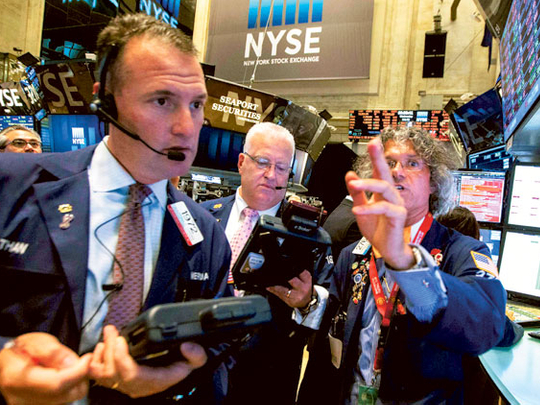
London: Global shares advanced toward fresh highs on Wednesday after European markets tracked gains in Asia.
Economic indicators in most regions are pointing to a pickup in production and offering support to equities despite stretched valuations.
Risk appetite has also been whetted by dovish central bank monetary policy, with the lack of rate hike hints from the Federal Reserve keeping the dollar stuck near two-month lows.
The MSCI World Index, which tracks stocks from developed economies, rose 0.2 per cent, to 1,757.84 points, close to all-time highs.
The pan-European FTSEurofirst 300 equity index was up 0.4 per cent at 1107 GMT, while German bund futures were trading broadly flat.
US stock indexes were little changed on Wednesday, with the Dow industrials hovering just below 17,000, after the US private sector created many more jobs than expected last month.
At its session high, the Dow was within 15 points of the milestone 17,000 level, and the S&P500 is less than 1.5 per cent away from 2,000. Both round-number levels could serve as psychological barriers as the market trades at record highs.
US private employers hired 281,000 workers in June, marking the biggest monthly increase since November 2012, well above market expectations for 200,000, data from payrolls processor ADP showed. The number bodes well for the government’s June payroll data due Thursday.
France bucked the broadly positive trend in Europe, with the blue-chip CAC 40 index dragged down by telecoms groups after Orange said it had ditched plans to take part in any domestic tie-ups.
“Investors are making only slight position adjustments,” said Nick Beecroft, analyst at Saxo Bank. “The low volatility environment is spooky and slightly unnerving.” Economists awaited the European Central Bank policy meeting on Thursday for more guidance after fresh data showed that falling energy costs depressed euro-zone industrial prices in May, marking the fifth consecutive monthly fall and underlining the low inflation that is plaguing the single currency bloc.
Industry data in Britain, meanwhile, showed a surge in home-building helped construction activity there to grow at its fastest annual pace in four months in June, bucking expectations for a slowdown.
Investors also focused on the ADP private-sector survey due at 1215 GMT along with a speech from US Federal Reserve head Janet Yellen at 1500 GMT. Her recent dovish bias, especially after the latest Fed meeting, has been a major factor that has led investors to cut favourable positions in the dollar.
“At the time Yellen seemed determined to give as little support as possible to rate hike speculation,” said Esther Reichelt, currency strategist at Commerzbank.
“This is unlikely to be any different today. But the market is waiting for Fed signals and therefore already small hints can be sufficient to affect the dollar.” The dollar index was slightly higher at 79.864, compared with a low of 79.740 struck on Tuesday.
EMERGING APPETITE Risk appetite was broadly positive globally, even though Brent crude oil steadied around $112 a barrel as fighting in Iraq heightened concerns over the country’s oil production.
The MSCI Emerging Markets index outperformed with a gain of 0.9 per cent.
Middle East and North African markets were jumpier: Cairo’s EGX index fell 0.5 per cent after Egypt’s president approved a law on Tuesday imposing new taxes on capital gains and stock dividends, as the government seeks to revive an economy battered by years of political turmoil.
However, Dubai’s main index rose 8 per cent, with builder Arabtec surging before a briefing on management issues later in the day.
South African stocks gained after the head of the striking NUMSA union said on Wednesday wage talks with an employers group would resume on Thursday night after more than 200,000 workers in the engineering and metals industry downed tools on Tuesday.
Overnight, Asian stocks had scored a three-year peak after a round of upbeat global economic data whetted risk appetites and helped Wall Street taste all-time highs.
Dealers said fund managers were rotating money out of bonds and into equities for the start of the second half of the year, nudging up US Treasury yields.
At the same time, the outlook for super-low rates in the major economies and an almost eerie absence of volatility across markets, encouraged investors to take on leveraged bets in search of higher returns — the so-called carry trade.












